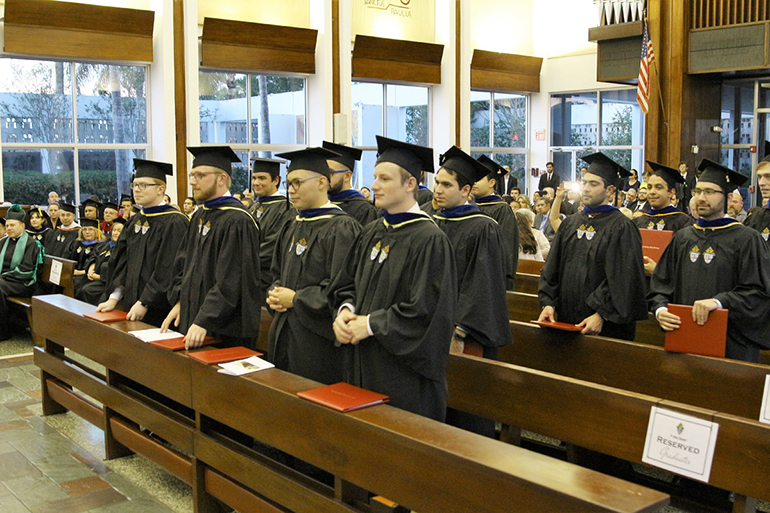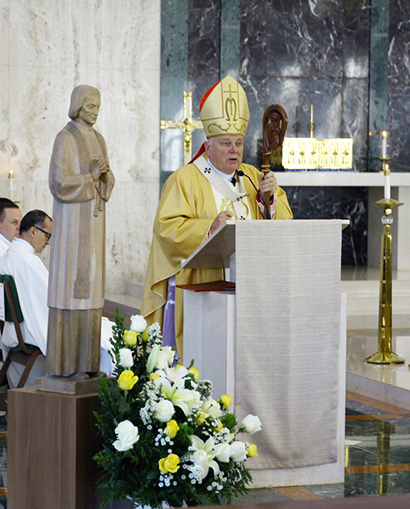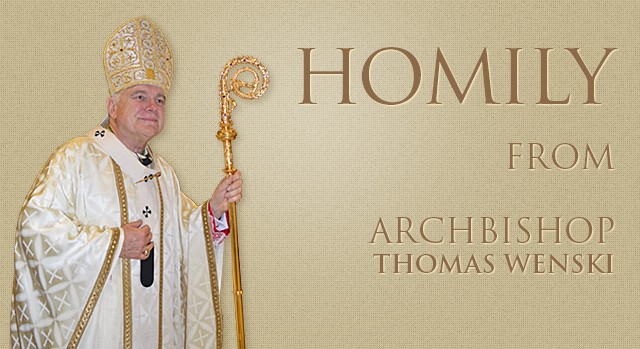By Archbishop Thomas Wenski - The Archdiocese of Miami
Photographer: COURTESY PHOTO Sixteen seminarians from the Archdiocese of Miami and the Dioceses of Orlando, Pensacola-Tallahassee, Venice, St.Petersburg and Palm Beach, graduated from St. John Vianney College Seminary in Miami, on May 9, 2018
Archbishop Thomas Wenski preached this homily at the graduation ceremony for St. John Vianney College Seminary in Miami, May 9, 2018.
The first reading this evening puts us in Greece, more specifically in Athens, the birthplace of philosophy, where Paul addresses the Athenians at the Areopagus. The Areopagus is variously translated as Mars’ Hill or Ares’ Rock.
So Paul attempts to evangelize the sophisticated, if superstitious, Athenians: On Ares’ Rock, Paul speaks about the Rock of Ages. Where the Greeks honored their god of war, Paul speaks about the Prince of Peace. He preaches not only in the synagogue but also in the marketplace. Pope Francis, who has constantly encouraged priests to go out of the sacristies and to go into the peripheries, is simply taking his direction from St. Paul himself.

Photographer: COURTESY PHOTO
Archbishop Thomas Wenski preached this homily at the graduation ceremony for St. John Vianney College Seminary in Miami, May 9, 2018.
And so should we. The prevailing philosophies of our post-Christian era — secular humanism’s scientific empiricism — as well as the New Age pantheism of our post-modern times are not that much different from the Epicureanism and Stoicism that Paul encountered. As Paul preached to the intellectual sophisticates of the pre-Christian world, we too must preach to the educated minds of our post-Christian world. We can learn much from Paul as we seek to present Jesus Christ to our world today. And in his talk at the Areopagus, he models for us how we should approach announcing the Gospel to a world that seems to be tired of what it believes is Christianity.
The New Evangelization calls us to proclaim Jesus “the same, yesterday, today and forever” in ways that are fresh — no one will hear the Gospel as good news if it is perceived as stale, as “old news”; but at the same time, if we do not preach Jesus Christ crucified, we will not be faithful to the Gospel.
During your years here at St. John Vianney, you have been exposed to a classic “liberal arts” education; you have reflected with the great minds of history on the reality of what is, and you have asked why what is is. Hopefully, your education at St. John’s has enriched you personally. A B.A. in philosophy certainly will not enrich you financially. But seminary education is not just about personal enrichment — it is about equipping you, intellectually and spiritually, for encountering the people of our times in the modern areopagi where they live, work, and play.
Pope Francis has warned us about being a self-referential Church, closed in on ourselves. Certainly that is a temptation today when the ascendant secularism of our time increasingly seeks to isolate men and women of faith, banning us as it were from the marketplaces and the areopagi of our times. Observe how Paul did not raise up the drawbridge to isolate himself from the outside world but he looked for onramps to enter into that world and engage it in dialog. Our Catholic faith is not the blind faith of fideism but a faith that is reasoned and reasonable.
Your study of philosophy — but also your study of music, art, great literature — is not meant to relativize faith but to translate into the idiom of today “the content of the faith that is professed, celebrated, lived and prayed in the Catholic Church.” At the same time, your years here have not been about intellectual formation only. As I am sure you’ve heard more than once, priestly formation is built on several pillars in addition to the academic: the human, the pastoral and the spiritual.
As the bishops of Latin America said at Aparecida, Brazil in 2007, in their final document — a document which the then cardinal of Buenos Aires, now Pope Francis, helped write: “a Catholic faith reduced to mere baggage, to a collection of rules and prohibitions, to fragmented devotional practices, to selective and partial adherence to the truths of faith . . . (or) to bland or nervous moralizing” cannot respond to the spiritual hungers of the postmodern 21st century or its agenda of aggressive secularism.
The tasks of the New Evangelization will not be successfully carried out by mediocre disciples. Today, as St. John Paul II insisted, we must re-propose to ourselves and to all the baptized the normal high standards of ordinary Christian life — for even the seemingly most simple baptized Catholic is not called to mediocrity but to holiness.
That holiness in which we can grow thanks to the Promised Holy Spirit will not guarantee us success. Even St. Paul had limited success with the Athenians — some outright rejected him and his message, others responded with some curiosity, but a few did believe. The Saint of Calcutta, Mother Teresa, used to say, God doesn’t ask us to be successful; he asks us only to be faithful.
As St. Paul says, “I became all things to all men” so as to save at least some.

